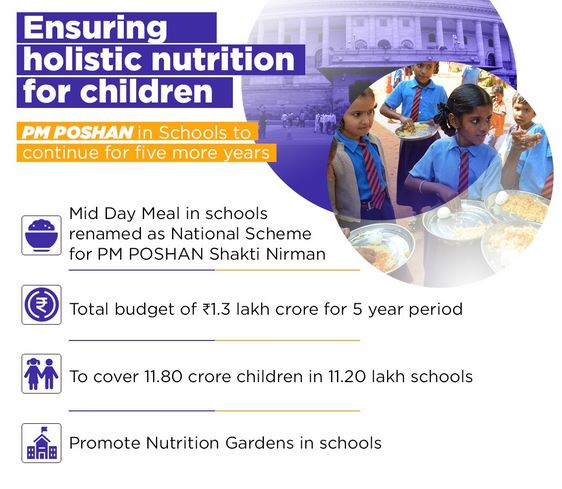Description

Copyright infringement not intended
In News:
- The Union Ministry of Education has formed a Joint Review Mission to visit West Bengal to examine the performance of the Pradhan Mantri Poshan Shakti Nirman (PM POSHAN).
- The Joint Review Mission includes;
- Nutrition experts
- Officers from the Union Government
- Officers from the State Government.
- The team will review the implementation of the scheme at the State, district and at school levels.
- The Joint Review Mission to review:
- Fund transferred from State to Schools/implementing agencies.
- Coverage of the Scheme.
- Availability of Management Structure at the State, District, and Block level.
- The delivery mechanism of food grains from State to Schools.
- Creation of Capital Assets.
- Construction of Kitchen-cum-stores.
- Procurement/Replacement of Kitchen Devices.
- Involvement of NGOs/Trust/Centralized kitchens in the Scheme.
- The payment of the Cost of Food grains to the Food Corporation of India.
- The Management Information System (MIS).
- The implementation of an Automated Monitoring System
.jpeg)
PM-Poshan Schemes:
- The Midday Meal Scheme is a school meal programme in India designed to better the nutritional standing of school-age children nationwide, the Ministry of Education.
- The programme supplies free lunches on working days for children in primary and upper primary classes in government, government-aided, local body, Education Guarantee Scheme, and alternate innovative education centres, Madarsa and Maqtabs supported under Sarva Shiksha Abhiyan, and National Child Labour Project schools run by the ministry of labour.
- Serving 120 million children in over 1.27 million schools and Education Guarantee Scheme centres, the Midday Meal Scheme is the largest of its kind in the world.
- The Midday Meal Scheme has been implemented in the Union Territory of Puducherry under the French Administration since 1930.
- In post-independent India, the Midday meal Scheme was first launched in Tamil Nadu, during the early 60s.
- Union Government initiated the National Programme of Nutritional Support to Primary Education (NP-NSPE) on 15 August 1995.
- By 2002, the scheme was implemented in all of the states under the orders of the Supreme Court of India.
- The name of the scheme was changed to PM-POSHAN (Pradhan Mantri Poshan Shakti Nirman) Scheme, in September 2021, by the Ministry of Education, which is the nodal ministry for the scheme.
- The Central Government also announced that an additional 24 lakh students receiving pre-primary education at government & government-aided schools would also be included under the scheme by 2022.
- Key Features of PM-POSHAN Scheme;
- It will provide one hot cooked meal in Government and Government-aided schools from 2021-22 to 2025-26.
- This is a Centrally-Sponsored Scheme which covers all school children studying in Classes I-VIII in Government, Government-Aided Schools.
- The concept of Tithi Bhojan will be encouraged extensively. Tithi Bhojan is a community participation programme in which people provide special food to children on special occasions/festivals.
- Promoting Nutrition Gardens in schools to give children first-hand experience with nature and gardening. The harvest of these gardens is used in the scheme providing additional micronutrients.
- Social Audit of the scheme is made mandatory in all the districts.
- Special provision to provide supplementary nutrition items to children in aspirational districts and districts with a high prevalence of Anemia.
- A nutrition expert is to be appointed in each school to measure and suggest health aspects such as Body Mass Index (BMI), weight, haemoglobin levels, etc.
- The involvement of Farmers' Producer Organizations (FPO) and Women Self Help Groups in the implementation of the scheme will be encouraged.
- The use of locally grown traditional food items to support local economic growth will be encouraged.
- Government to switch to Direct Benefit Transfer (DBT) system to provide payment under the scheme.

Must Read: https://www.iasgyan.in/daily-current-affairs/national-food-security-act-nfsa
https://www.pib.gov.in/PressReleasePage.aspx?PRID=1891104













